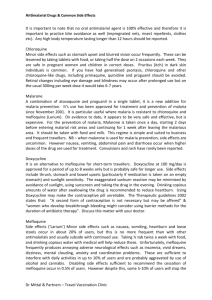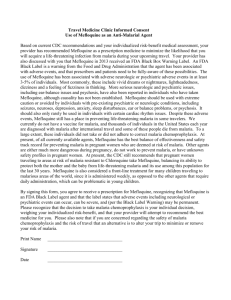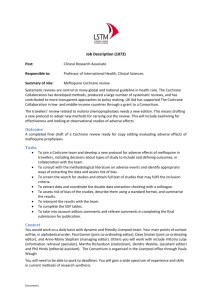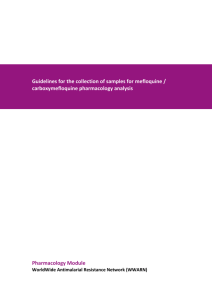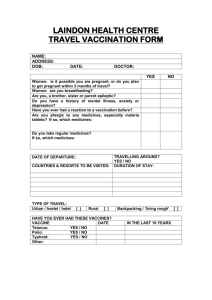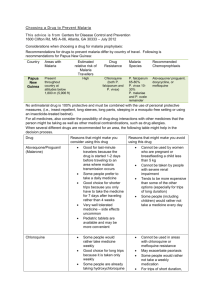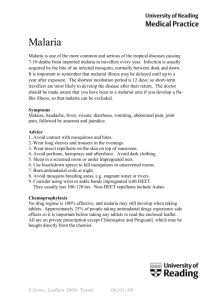New CSP * Please refer to the comments above
advertisement
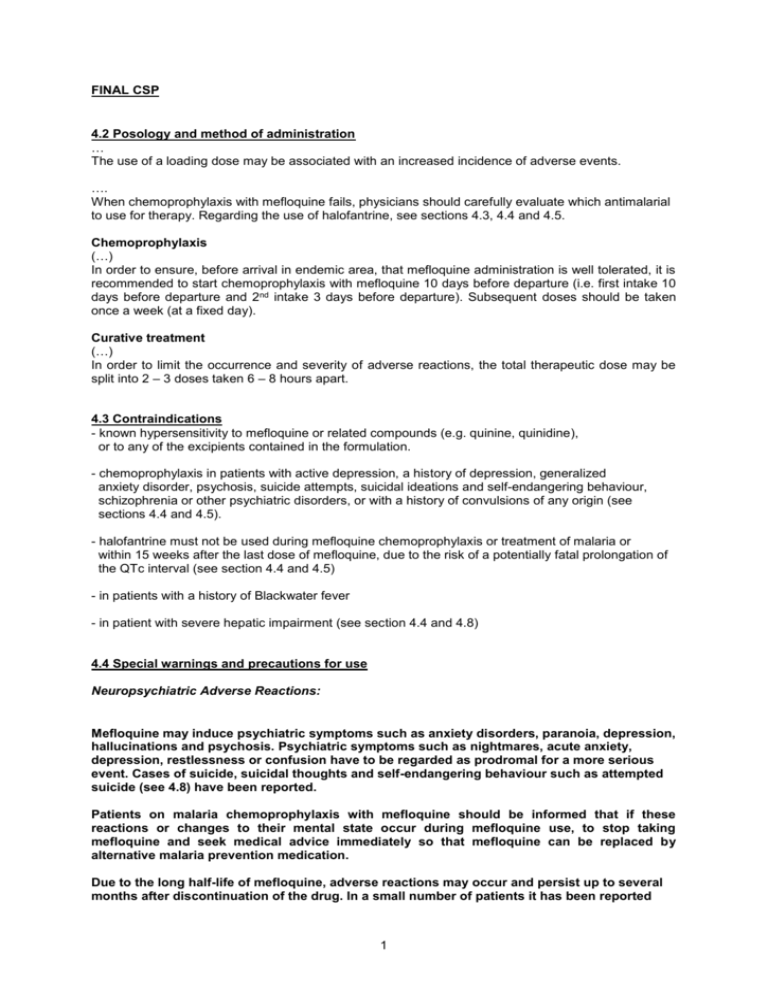
FINAL CSP 4.2 Posology and method of administration … The use of a loading dose may be associated with an increased incidence of adverse events. …. When chemoprophylaxis with mefloquine fails, physicians should carefully evaluate which antimalarial to use for therapy. Regarding the use of halofantrine, see sections 4.3, 4.4 and 4.5. Chemoprophylaxis (…) In order to ensure, before arrival in endemic area, that mefloquine administration is well tolerated, it is recommended to start chemoprophylaxis with mefloquine 10 days before departure (i.e. first intake 10 days before departure and 2nd intake 3 days before departure). Subsequent doses should be taken once a week (at a fixed day). Curative treatment (…) In order to limit the occurrence and severity of adverse reactions, the total therapeutic dose may be split into 2 – 3 doses taken 6 – 8 hours apart. 4.3 Contraindications - known hypersensitivity to mefloquine or related compounds (e.g. quinine, quinidine), or to any of the excipients contained in the formulation. - chemoprophylaxis in patients with active depression, a history of depression, generalized anxiety disorder, psychosis, suicide attempts, suicidal ideations and self-endangering behaviour, schizophrenia or other psychiatric disorders, or with a history of convulsions of any origin (see sections 4.4 and 4.5). - halofantrine must not be used during mefloquine chemoprophylaxis or treatment of malaria or within 15 weeks after the last dose of mefloquine, due to the risk of a potentially fatal prolongation of the QTc interval (see section 4.4 and 4.5) - in patients with a history of Blackwater fever - in patient with severe hepatic impairment (see section 4.4 and 4.8) 4.4 Special warnings and precautions for use Neuropsychiatric Adverse Reactions: Mefloquine may induce psychiatric symptoms such as anxiety disorders, paranoia, depression, hallucinations and psychosis. Psychiatric symptoms such as nightmares, acute anxiety, depression, restlessness or confusion have to be regarded as prodromal for a more serious event. Cases of suicide, suicidal thoughts and self-endangering behaviour such as attempted suicide (see 4.8) have been reported. Patients on malaria chemoprophylaxis with mefloquine should be informed that if these reactions or changes to their mental state occur during mefloquine use, to stop taking mefloquine and seek medical advice immediately so that mefloquine can be replaced by alternative malaria prevention medication. Due to the long half-life of mefloquine, adverse reactions may occur and persist up to several months after discontinuation of the drug. In a small number of patients it has been reported 1 that dizziness or vertigo and loss of balance continued for months after discontinuation of the drug. To minimise the risk for these adverse reactions, mefloquine must not be used for chemoprophylaxis in patients with active or a history of psychiatric disturbances such as depression, anxiety disorders, schizophrenia or other psychiatric disorders (see section 4.3). Hypersensitivity: Hypersensitivity reactions ranging from mild cutaneous events to anaphylaxis may occur. Cardiac toxicity: Concomitant administration of mefloquine and other related compounds (e.g. quinine, quinidine and chloroquine) may produce electrocardiographic abnormalities. Due to the risk of a potentially fatal prolongation of the QTc interval, halofantrine must not be used during mefloquine chemoprophylaxis or treatment of malaria or within 15 weeks after the last dose of mefloquine. Due to increased plasma concentrations and elimination half-life of mefloquine following co-administration with ketoconazole, the risk of QTc prolongation may also be expected if ketoconazole is taken during mefloquine chemoprophylaxis or treatment of malaria or within 15 weeks after the last dose of mefloquine (see sections 4.5 and 5.2). Patients should be advised to consult a doctor, if signs of arrhythmia or palpitations occur during chemoprophylaxis with mefloquine. These symptoms might be in rare cases precede severe cardiologic side effects. Seizure disorders: In patients with epilepsy, mefloquine may increase the risk of convulsions. Therefore in such cases, mefloquine should be used only for curative treatment (i.e. not for stand-by therapy) and only if compelling reasons exist (see sections 4.3 and 4.5). Concomitant administration of mefloquine and anticonvulsants (e.g. valproic acid, carbamazepine, phenobarbital or phenytoin) may reduce seizure control by lowering the plasma levels of aniticonvulsant. Therefore, patients concurrently taking antiseizure medication, including valproic acid, carbamazepine, phenobarbital, and phenytoin, and mefloquine should have the blood level of their antiseizure medication monitored and the dosage adjusted as necessary. Concomitant administration of mefloquine and drugs known to lower the epileptogenic threshold (antidepressants such as tricyclic or selective serotonin reuptake inhibitors (SSRIs); bupropion; antipsychotics; tramadol; chloroquine or some antibiotics) may increase the risk of convulsions (see 4.5). Neuropathy Cases of polyneuropathy (based on neurological symptoms such as pain, burning, sensory disturbances or muscle weakness, alone or in combination) have been reported in patients receiving mefloquine. Mefloquine should be discontinued in patients experiencing symptoms of neuropathy, including pain, burning, tingling, numbness, and/or weakness in order to prevent the development of an irreversible condition (see section 4.8). Eye disorders Any patient presenting with a visual disorders should be referred to a physician as certain conditions (such as retinal disorders or optic neuropathy) may require stopping treatment with mefloquine. Impaired liver function: In patients with impaired liver function the elimination of mefloquine may be prolonged, leading to higher plasma levels and a higher risk of adverse reactions. Renal Impairment Due to limited data, mefloquine should be administered with caution in patients with renal impairment. Pneumonitis 2 Pneumonitis of possible allergic etiology has been reported in patients receiving mefloquine (see section 4.8). Patients who develop signs of dyspnoea, dry cough or fever etc. while receiving mefloquine should be advised to contact a doctor to undergo medical evaluation. Blood and lymphatic system disorders: Cases of agranulocytosis and aplastic anaemia have been reported during mefloquine therapy (see section 4.8) Inhibitors and Inducers of CYP3A4: Inhibitors and Inducers of the isoenzyme CYP3A4 may modify the pharmacokinetics/metabolism of mefloquine, leading to an increase or decrease in mefloquine plasma concentrations (see section 4.5). Interaction with vaccines: When mefloquine is taken concurrently with oral live typhoid vaccines, attenuation of immunisation cannot be excluded. Vaccinations with oral attenuated live bacteria should therefore be completed at least 3 days before the first dose of mefloquine (see section 4.5). Long term use During clinical trials, this drug was not administered for longer than one year. If the drug is to be administered for a prolonged period, periodic evaluations including liver function tests and periodic ophthalmic examinations should be performed. Galactose intolerance: Patients with rare hereditary problems of galactose intolerance, the Lapp lactase deficiency or glucose-galactose malabsorption should not take this medicine. Geographical drug resistance: Geographical drug resistance patterns of P. falciparum occur and preferred choice of malaria chemoprophylaxis might be different from one area to another. Resistance of P. falciparum to mefloquine has been reported, predominantly in areas of multi-drug resistance in South-East Asia. Cross-resistance between mefloquine and halofantrine and cross-resistance between mefloquine and quinine have been observed in some regions. For current advice on geographical resistance patterns competent national expert centers should be consulted. Contraception measures: Women of childbearing potential who are receiving mefloquine for chemoprophylaxis and treatment of malaria should take reliable contraceptive precautions for the entire duration of use and for three months after the last dose of mefloquine (see section 4.6). Only for France: ----------------------------------------------------------------------------------------------------------------------------- ----------Only for indication limited to uncomplicated malaria! An increased risk of neuropsychiatric syndrome occurring after recovery from severe acute malaria has been evidenced in Southeast Asia in patients whose parenteral anti-malaria treatment was switched to oral mefloquine. Cases of convulsions, mental confusion, psychosis, tremors in extremity have been reported. Patients recovered without sequelea within 10 days. Consequently, as far as possible, mefloquine use as oral switch in case of severe acute malaria should be avoided.” ---------------------------------------------------------------------------------------------------------------------------------------4.5 Interaction with other medicinal products and other forms of interaction Halofantrine There is evidence that the use of halofantrine during mefloquine chemoprophylaxis or treatment of malaria, or within 15 weeks after the last dose of mefloquine, causes a significant lengthening of the QTc interval (see section 4.3, 4.4). Clinically significant QTc prolongation has not been found with mefloquine alone. Other drugs that prolong the QTc interval: Concomitant administration of other drugs known to alter cardiac conduction (e.g. anti-arrhythmic or β-adrenergic blocking agents, calcium channel blockers, antihistamines or H1-blocking agents, tricyclic antidepressants and phenothiazines) might also contribute to a prolongation of the QTc interval. 3 Anticonvulsants and drugs lowering the epileptogenic threshold: Patients taking mefloquine while on concomitant treatment with anticonvulsants (e.g. valproic acid, carbamazepine, phenobarbital or phenytoin)had loss of seizure control and lower than expected anticonvulsants blood level. Therefore, dosage adjustments of antiseizure medication may be necessary in some cases. Concomitant administration of mefloquine and drugs known to lower the epileptogenic threshold (antidepressants such as tricyclic or selective serotonin reuptake inhibitors (SSRIs); bupropion; antipsychotics; tramadol; chloroquine or some antibiotics) may increase the risk of convulsions (see section 4.4). Other Interactions/ Inhibitors and Inducer of CYP3A4 Mefloquine does not inhibit or induce the cytochrome P450 enzyme system. It is therefore not expected that the metabolism of drugs given concomitantly with mefloquine is affected. However, inducers (rifampicine, carbamazepine, phenytoin, efavirenz) or inhibitor of the isoenzyme CYP3A4 may modify the pharmacokinetics/metabolism of mefloquine, leading to an increase or decrease in mefloquine plasma concentration. The clinical consequences of these effects are unknown and a close clinical surveillance is warranted. (see section 4.4) Interaction with vaccines: When mefloquine is taken concurrently with oral live typhoid vaccines, attenuation of immunisation cannot be excluded. Vaccinations with oral attenuated live bacteria should therefore be completed at least 3 days before the first dose of mefloquine (see section 4.4) No other drug interactions are known. Nevertheless, the effects of mefloquine on travellers receiving co-medication, particularly those on anticoagulants or antidiabetics, should be checked before departure. 4.6 Pregnancy and lactation – not part of this procedure! Administered at 5-20 times the therapeutic dose in man, mefloquine was teratogenic in mice and rats and embryotoxic in rabbits; however, clinical experience with Lariam has not revealed an embryotoxic or teratogenic effect. Nevertheless, Lariam should be used during the first trimester only if the expected benefit justifies the potential risk to the fetus. Women of childbearing potential should be advised to practice contraception during malaria prophylaxis with Lariam and for up to 3 months thereafter. However, in the case of unplanned pregnancy, malaria chemoprophylaxis with Lariam is not considered an indication for pregnancy termination. For use of mefloquine during pregnancy, current national and international guidelines should be consulted. Mefloquine is secreted into the breast milk in small amounts, the activity of which is unknown. Circumstantial evidence suggests that adverse effects do not occur in breast-fed infants whose mothers are taking Lariam. For use of mefloquine in nursing mothers current national and international guidelines should be consulted. 4.7 Effects on ability to drive and use machines Caution should be exercised with regard to activities requiring alertness and fine motor coordination such as driving, piloting aircraft, operating machinery, and deep-sea diving, as dizziness, vertigo or a loss of balance, or other disorders of the central or peripheral nervous system and psychiatric disorder have been reported during and following the use of mefloquine. These effects may occur after therapy is discontinued due to the long half-life of the drug. In a small number of patients, dizziness or vertigo and loss of balance have been reported to continue for months after discontinuation of the drug (see section 4.8). 4.8 Undesirable effects a) Summary of safety profile At the doses given for acute malaria, adverse reactions to mefloquine may not be distinguishable from symptoms of the disease itself. In chemoprophylaxis, the safety profile of mefloquine is characterised by a predominance of neuropsychiatric adverse reactions. Due to the long half-life of mefloquine, adverse reactions may occur or persist up to several weeks after discontinuation of the drug. Of the most common adverse reactions to Lariam chemoprophylaxis, nausea, vomiting and dizziness are generally mild and may decrease with prolonged use, in spite of increasing plasma drug levels. 4 b) Tabulated list of adverse reactions In the table below, an overview of adverse reactions is presented, based on post-marketing data and a double-blind, randomized study including 483 patients on mefloquine (Overbosch et al, 2001). The frequencies presented in this table are based on the double-blind randomized study. Adverse reactions are listed according to MedRA system organ class and frequency category. Frequency categories are defined using the following convention: very common (>1/10), common (≥ 1/100 to < 1/10), uncommon (≥ 1/1,000 to < 1/100), rare (≥ 1/10,000 to < 1/1,000), very rare (<1/10,000), not known (cannot be estimated from the available data). Within each frequency grouping, adverse reactions are presented in order of decreasing seriousness. Blood and Lymphatic System Disorders Not agranulocytosis, aplastic anaemia, leukopenia, leukocytosis, thrombocytopenia known Immune system disorders Not known Hypersensitivity from mild cutaneous events to anaphylaxis Metabolism and nutrition disorders Not known Decreased appetite Psychiatric disorders a),b) Abnormal dreams, insomnia Very common Common Not known Anxiety, depression Agitation, restlessness, mood swings, panic attacks, confusional state, hallucinations, aggression, psychotic disorder, paranoia, disturbance in attention, suicide, attempted suicide, suicidal ideation and self-endangering behavior Nervous system disorders a),b) Dizziness, headache Common Not known Balance disorder, somnolence, syncope, convulsions, memory impairment, amnesia (sometimes long lasting for more than 3 months), peripheral sensory neuropathy, peripheral motor neuropathy, (including paraesthesia, tremor and ataxia), encephalopathy, speech disorder Eye disorders Common Visual impairment Not known Vision blurred, cataract, retinal disorders and optic neuropathy which may occur with latency during or after treatment Ear and labyrinth disorders Common Not known Vertigo Vestibular disorders including tinnitus, partial deafness (sometimes prolonged), and hearing impaired 5 Cardiac disorders Not Tachycardia, palpitation, bradycardia, irregular heart rate, extrasystoles, other transient known conduction disorder, AV block Vascular disorders Not Cardiovascular disorders (hypotension, hypertension, flushing) known Respiratory, thoracic and mediastinal disorders Not Dyspnoea, pneumonia, pneumonitis of possible allergic etiology known Gastrointestinal disorders Common Nausea, diarrhoea, abdominal pain, vomiting Not Dyspepsia known Hepatobiliary disorders Not Asymptomatic transient transaminase (ALT, AST, GGT) increased, hepatitis, hepatic known failure, jaundice Skin and subcutaneous tissue disorders Common Pruritus Not Rash, erythema, urticaria, alopecia, hyperhidrosis, erythema multiforme, Stevensknown Johnson syndrome Musculoskeletal and Connective Tissue Disorders Not Muscular weakness, muscle spasms, myalgia, arthralgia known General disorders and administration site disorders Not Oedema, chest pain, asthenia, malaise, fatigue, chills, pyrexia known a) b) Occasionally it has been reported that these symptoms persist for a long time after mefloquine is discontinued. See section c) c) Description of selected adverse reactions Neuropsychiatric adverse reactions: If neuropsychiatric reactions or changes to the mental state occur during mefloquine chemoprophylaxis, the patient should be advised to stop taking mefloquine and seek medical advice immediately so that mefloquine can be replaced by alternative malaria prevention medication (see section 4.4). Studies in vitro and in vivo showed no haemolysis associated with G6PD deficiency. 4.9 Overdose Symptoms and signs In cases of overdosage with mefloquine, the symptoms mentioned under section 4.8 (Undesirable effects) may be more pronounced. Treatment Patients should be managed by symptomatic and supportive care following mefloquine overdose. There are no specific antidotes. The use of oral activated charcoal to limit mefloquine absorption may be considered within one hour of ingestion of an overdose. Monitor cardiac function (if possible by ECG) and neuropsychiatric status for at least 24 hours. Provide symptomatic and intensive supportive treatment as required, particularly for cardiovascular disorders. Elimination of mefloquine and its metabolites is limited by haemodialysis. 6
